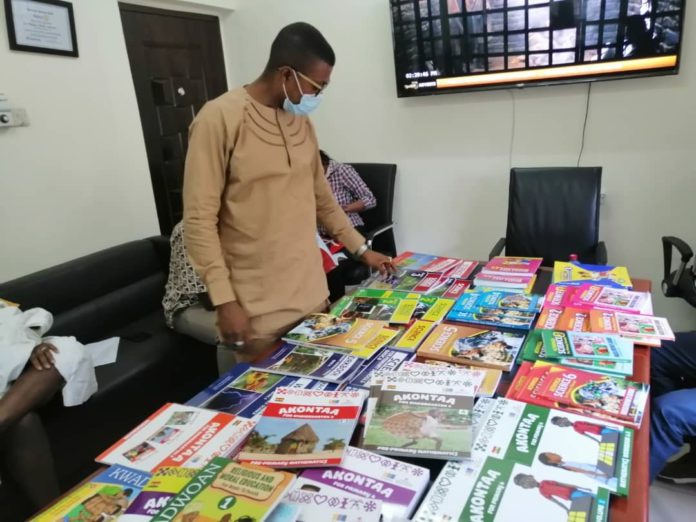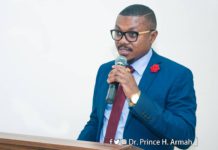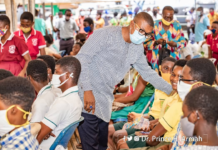
In the last four decades, Ghana has embarked on three significant school curriculum reforms involving the 1987 basic education reform, 1996 fCUBE reform and the current standards-based curriculum (SBC) reform.
The SBC reform has led to a complete overhaul of the objectives-based curriculum introduced in the 1987 reforms. Anchored on the B. F. Skinners and Edward Thondikes behaviourists learning theories, the objectives-based curriculum encouraged learners to demonstrate competence by regurgitating information without making meaning to everyday context; an approach understood in the extant literature as drill and practice.
In contrast, the contents of the basic school curriculum now emphasize the development of not only fundamental knowledge and skills but also the development of national values and core competencies needed for sustainable development and sustainable lifestyles for all in the 21st century. The goals of the SBC reform are different from the earlier ones, and the context of implementation, in terms of resources, technology and teacher capacity, have comparatively improved, and therefore, cannot be rolled out the same way as previous reforms.
None of the curriculum reforms we have witnessed in the country in the last three decades was rolled out, concurrently with published textbooks for the new (reviewed) curriculum. For example, the mathematics textbook schemes printed in 1988, and supplied to JSS across the country to implement the 1987 reform, were developed in the 1970s. Their contents were thus obsolete from the onset as manifested in the preface to the junior high school textbooks as follows:
“the pupil’s and accompanying teacher’s guide were prepared at a writing workshop at Specialist Training College, Winneba, and Adult residential college, Tsito, in 1977.
“… Some of the materials were adapted from texts prepared under the West African Regional Mathematics Program (WARMP), Accra, Ghana. However, alterations have been made in view of the new educational programme, in which more pupils of very varied ability will be using the book. (CRDD, 1987, p.v)[1].
It is important to note that even the said WARMP materials were adapted in the early 1970s from the African Mathematics Program (AMP) (or Entebbe Mathematics) materials, which were also developed in a major curriculum reform across Africa in the1960s.
In the fCUBE reforms which begun in 1996, it took more than four years after the syllabus review before the first set of textbooks written for the new curricula were ready in schools across the country in 2000. So, why are we so much on the government to ensure textbooks are ready for the new curriculum? Are textbooks the only requirements for successfully rolling out a curriculum reform? We contend that textbooks are necessary but not sufficient requirements to successful curriculum implementation as per evidence from global best practices. In a liberalized, market-driven publishing industry, the market determines which subject-specific textbooks are published and sold. This potentially explains why there are still no textbooks for some of our secondary school subject curricula, after decades of implementation and no approved textbooks for some SBC subjects after two years of publishing the curriculum.
It is therefore our considered opinion that the rolling out of the new reform does not necessarily require concurrent production of textbooks but resource materials that use the old textbooks and provide teachers with ‘big ideas’ or activities that encourage the use of creative and learning centred pedagogies. After all, the different types of soil haven’t changed, neither has the principle underlying adding three digits numbers nor the functions of the oesophagus changed merely because of the reviewed curriculum. What has changed are the novel approaches to teaching these concepts and associated assessment techniques that the SBC emphasize. For these reasons, the framers of the curricula have provided resource packs that contain sample scripted lessons, lesson plans, assessment tools, among others to facilitate the innovative ways teachers are expected to teach under the SBC.
While it is important to support our hard-working and selfless teachers to deliver the SBC with fidelity, it is equally important to avoid being overly prescriptive, as textbooks often do, but encourage teacher autonomy instead. To further elaborate the foregoing point, the seminal work of Clarence Edward Beeby (1902-1998) on the theory of the growth of basic education in developing countries is referenced. Influenced by the works of progressive educationists, like John Dewey, Beeby’s model provides that the growth of a basic education system goes through four stages namely dame school, formalism, transition and meaning, which can be used to explain changes in basic education systems in developing countries contexts such as Ghana.
The first stage called the dame school stage occurs where the teachers are neither well educated nor trained, followed by formalism stage, in which the teachers are given some training and a reasonable amount of education, but the syllabus is rigid, there is possibly only one textbook, a state textbook, and there is a great emphasis on inspection and examinations. Then the schools proceed to the third stage understood as the stage of transition, where teachers are better educated and many have diplomas and degrees, but there is little in the classroom to cater for the emotional and creative life of the learners.
We hypothesize that most of our basic schools in Ghana are at this transition stage, given our combined decades of experience in this body of knowledge. The fourth stage is described as, the stage of meaning, where teachers are both well-educated and well-trained, and students are encouraged to think for themselves. The stage is characterized by teachers stressing meaning and its applications in understanding and participating in school life and community rather than the accumulation of facts and techniques. Learning experiences take account of individual differences to assure success for all learners with teachers being involved very much in the assessment of their students. This stage emphasizes a great deal of teacher autonomy and self-directed professional growth.
Given the focused attention on teacher education reforms in recent years including the introduction of stringent gatekeeping benchmarks into the teaching profession, we remain convinced that our basic school system has reached the threshold to leap into Beeby’s meaning stage of educational change. As Beeby suggests, the key to a basic education system to reach the meaning stage is the ability of its teachers to promote change, and the ability of teachers to promote change is a function of their confidence, which in itself is a function of their general and professional education.
Some five decades ago, a qualified teacher’s education background was relatively low and many were untrained coupled with no means of getting information on the internet, textbooks were required anytime syllabuses were revised. Usually, only one book was provided and the old textbooks were completely disregarded even though most of its contents were still relevant. But today, we have better-educated, trained teachers many of who are now (or being) licensed and can work together in the context of professional learning communities built into the reform.
Especially in the 21st century, technology in today’s world appears to play a pervasive role in stimulating improved learning experiences and outcomes. With the proliferation of smart or android phones, teachers’ capacity to use technology is increasing, and many today surf the internet for resources for their personal learning and also for preparation to teach. In line with Ghana’s ICT education policy, which emphasizes ICT as a means of learning, the government is supplying teachers with laptops and thus strengthening their capacity to implement a meaning-stage curriculum. Besides, there are a plethora of textbooks that are eBooks available free (or at minimal costs) online to both teachers and learners.
As previously highlighted, designers of the standards-based curriculum for basic schools developed examples of lessons and resources required to supplement the existing textbooks for the implementation of the curriculum in schools. Except for the new subjects introduced (e.g. Our World Our People, Creative Arts and Design, Career Technology, etc.), what has changed in the curriculum is not entirely the content but the approach to teaching and learning.
At the stage of meaning, teachers are both well-educated and well-trained and must use creative pedagogies that encourage learners to think for themselves and take responsibility for their learning. The teachers must understand teaching as bringing about meaning through activities that develop learners’ knowledge, skills, core competencies and attitudes. As the teacher facilitates the development of these competencies in a community of learners, they also cater for individual differences and employs gender- and social-inclusive skills.
It is the obligation of NaCCA to find publishers who can produce national resource books that will support the implementation of the SBC. But do the publishers have teachers/subject experts who really understand ‘teaching as bringing about meaning’, and can use such understanding to develop resource books that provide ‘big ideas’ or activities that encourage the use of creative and learning centered.
There is no blueprint for primary (or basic) education anywhere; no two national educational systems are comparable given the diversities in their political systems and national educational priorities. Primary and or basic education curricula in Ghana since independence had been experiments designed by our ‘dreamers’ (i.e., educationists/politicians/society) about meeting the needs and changes in society for all our young people to survive and succeed in the generations ahead of them. As the MoE, NaCCA, GES are currently doing, more resources and capacity building, if available, should be deployed to support teachers to improve their capacity to implement the curriculum using resource books, until textbooks are available in schools. It will be a while before the publishers and writers/teachers understand the full expectations of the current standards-based reforms.
Dr Damian Kofi Mereku is a curriculum specialist and an Associate Professor in Mathematics Education at the University of Education, Winneba.
Dr Prince Hamid Armah is the Member of Parliament for Kwesimintsim, former Director–General of the National Council for Curriculum and Assessment, and Vice Chairman of the Parliamentary Select Committee on Education.
[1] CRDD (Curriculum Research and Development Division of GES) (1987). Ghana mathematics series: Junior secondary schools pupil’s book 1 (1st edition). Accra, Ghana: Ghana Publishing Corporation.





